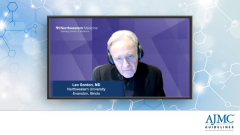
Key Updates in NCCN Guidelines Surrounding DLBCL Treatment
Key recommendations and recent updates in the latest version of NCCN guidelines for DLBCL are outlined by Dr Gordon.
Episodes in this series

Leo Gordon, MD: The latest version of the 5.2023, we call it. It’s the sort of fifth update in 2023 [for] diffuse large B-cell lymphoma. First of all, I should go one back [to] the fourth and the fifth iterations. The main advantage or the main recommendation was to add the bispecific antibodies to the guidelines, and that is for third-line diffuse large B-cell lymphoma. First it was epcoritamab and then glofitamab, or in a different order, [but] was added in subsequent iterations of the guidelines. I think those are the major ones. Also, to include histologic transformation of indolent lymphoma to diffuse large B-cell lymphoma and to include those bispecifics for those diseases. Also, when you’re making the distinction between de novo diffuse large B-cell lymphoma and transformed diffuse large B-cell lymphoma. And so, I think those are [what] I would say are the major updates to the guidelines and most recent.
I think the NCCN [National Comprehensive Cancer Network] has been very forward thinking and careful about including patient advocates as part of the committee. There’s always or almost always a patient advocate on the committee, and they’ve been very valuable in making recommendations and suggestions. You know, lest we get sort of too academic and not down-to-earth or practical enough at the committee meetings. And so, I think it’s an important part of it. I wish there were other ways to do it. There isn’t a way that I’m aware of anyway, that patients get to comment on the guidelines once they’re released. But there is participation during the meetings, and I think that goes on throughout the entire NCCN disease-oriented guidelines. So, for lung cancer, for breast cancer, and for the different types of lymphomas. So, that’s what we do.
I think the practice has been improved by standardizing treatment options, so people aren’t kind of all over the place in their choice, even for first-line treatment. Listing maybe 2 or 3 choices now, you know, Rituxan-CHOP [cyclophosphamide, doxorubicin, vincristine, prednisone] is sort of still the standard, but there is allowance for different regimens and infusion regimens like dose-adjusted EPOCH [etoposide, prednisone, vincristine, cyclophosphamide, doxorubicin] and, more recently, maybe in a couple of iterations ago in the guidelines, the addition of polatuzumab, based on a randomized trial that suggests a progression-free survival for polatuzumab. And so, we’ve included that as an option also. So, pola-R-CHP, so it’s basically polatuzumab substituting for vincristine. So, I think that’s one example and now, I think I don’t know that we can say for sure that we’ve improved patient outcomes. I hope that we have, but that’s a hard metric to measure accurately, I think. So, I hope that patient outcomes are improved. But, certainly, I think we’ve been able to more often standardize care. The other thing I will say, and we don’t do this so much at our institution, but a lot of places I see people in practice will pull out the guidelines when they’re meeting with a patient for the first time and go over the guidelines with the patient and in fact put it in their notes that this treatment I’m recommending is consistent with the NCCN guidelines on diffuse large B-cell lymphoma, for example. And so overall, I think it’s been a positive. I actually look at guidelines to think I don’t see anything about lymphoma, but if someone asks a question or presents a case or a patient of mine may develop another malignancy, I go to the guidelines for the most recent updates and how to think about it and how to manage it.
Transcript is AI-generated and edited for clarity and readability.
Newsletter
Stay ahead of policy, cost, and value—subscribe to AJMC for expert insights at the intersection of clinical care and health economics.










